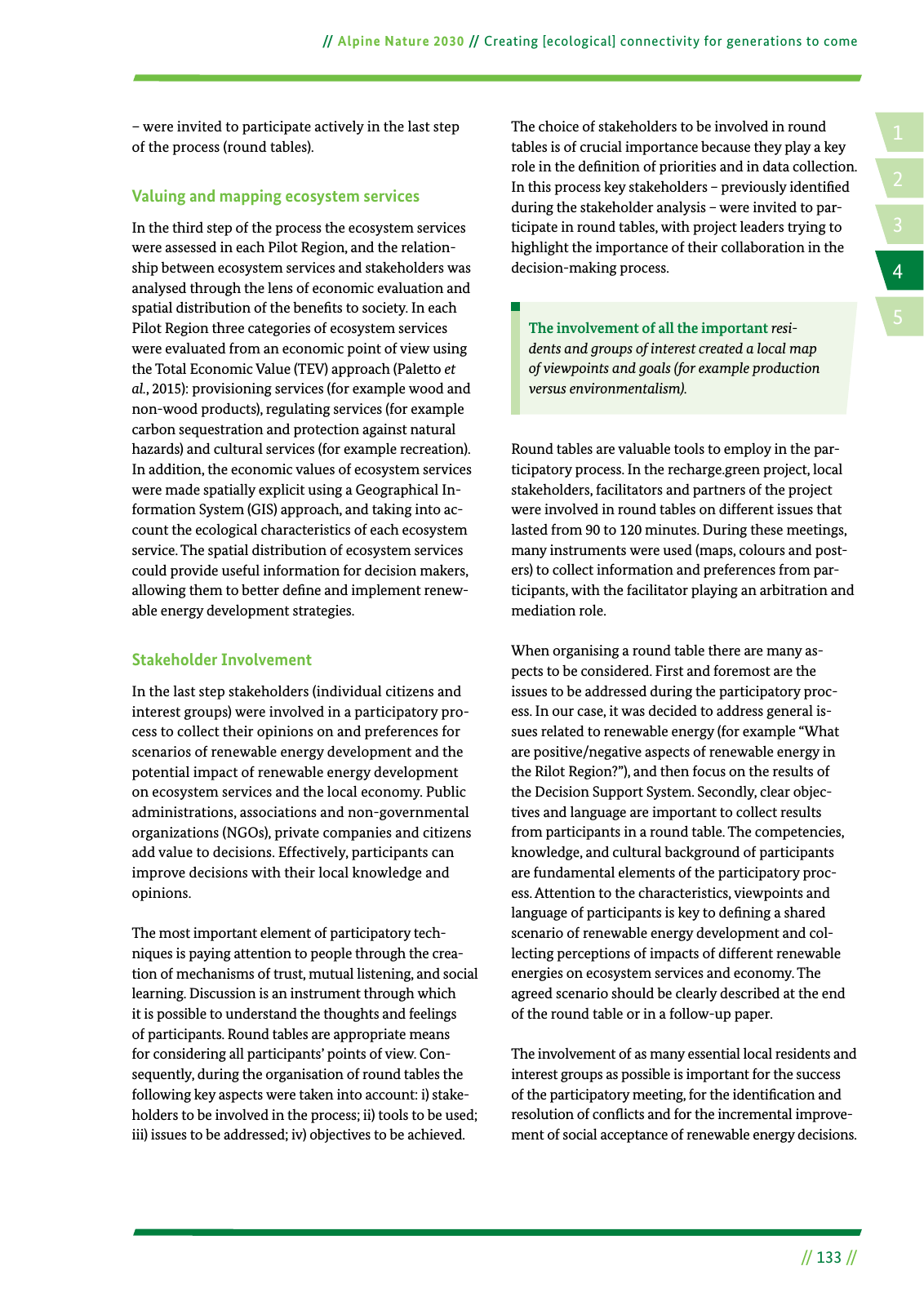14 2 5 3 Alpine Nature 2030 Creating ecological connectivity for generations to come 133 were invited to participate actively in the last step of the process round tables Valuing and mapping ecosystem services In the third step of the process the ecosystem services were assessed in each Pilot Region and the relation ship between ecosystem services and stakeholders was analysed through the lens of economic evaluation and spatial distribution of the bene ts to society In each Pilot Region three categories of ecosystem services were evaluated from an economic point of view using the Total Economic Value TEV approach Paletto et al 2015 provisioning services for example wood and non wood products regulating services for example carbon sequestration and protection against natural hazards and cultural services for example recreation In addition the economic values of ecosystem services were made spatially explicit using a Geographical In formation System GIS approach and taking into ac count the ecological characteristics of each ecosystem service The spatial distribution of ecosystem services could provide useful information for decision makers allowing them to better de ne and implement renew able energy development strategies Stakeholder Involvement In the last step stakeholders individual citizens and interest groups were involved in a participatory pro cess to collect their opinions on and preferences for scenarios of renewable energy development and the potential impact of renewable energy development on ecosystem services and the local economy Public administrations associations and non governmental organizations NGOs private companies and citizens add value to decisions Effectively participants can improve decisions with their local knowledge and opinions The most important element of participatory tech niques is paying attention to people through the crea tion of mechanisms of trust mutual listening and social learning Discussion is an instrument through which it is possible to understand the thoughts and feelings of participants Round tables are appropriate means for considering all participants points of view Con sequently during the organisation of round tables the following key aspects were taken into account i stake holders to be involved in the process ii tools to be used iii issues to be addressed iv objectives to be achieved The choice of stakeholders to be involved in round tables is of crucial importance because they play a key role in the de nition of priorities and in data collection In this process key stakeholders previously identi ed during the stakeholder analysis were invited to par ticipate in round tables with project leaders trying to highlight the importance of their collaboration in the decision making process The involvement of all the important resi dents and groups of interest created a local map of viewpoints and goals for example production versus environmentalism Round tables are valuable tools to employ in the par ticipatory process In the recharge green project local stakeholders facilitators and partners of the project were involved in round tables on different issues that lasted from 90 to 120 minutes During these meetings many instruments were used maps colours and post ers to collect information and preferences from par ticipants with the facilitator playing an arbitration and mediation role When organising a round table there are many as pects to be considered First and foremost are the issues to be addressed during the participatory proc ess In our case it was decided to address general is sues related to renewable energy for example What are positive negative aspects of renewable energy in the Rilot Region and then focus on the results of the Decision Support System Secondly clear objec tives and language are important to collect results from participants in a round table The competencies knowledge and cultural background of participants are fundamental elements of the participatory proc ess Attention to the characteristics viewpoints and language of participants is key to de ning a shared scenario of renewable energy development and col lecting perceptions of impacts of different renewable energies on ecosystem services and economy The agreed scenario should be clearly described at the end of the round table or in a follow up paper The involvement of as many essential local residents and interest groups as possible is important for the success of the participatory meeting for the identi cation and resolution of con icts and for the incremental improve ment of social acceptance of renewable energy decisions

Hinweis: Dies ist eine maschinenlesbare No-Flash Ansicht.
Klicken Sie hier um zur Online-Version zu gelangen.
Klicken Sie hier um zur Online-Version zu gelangen.